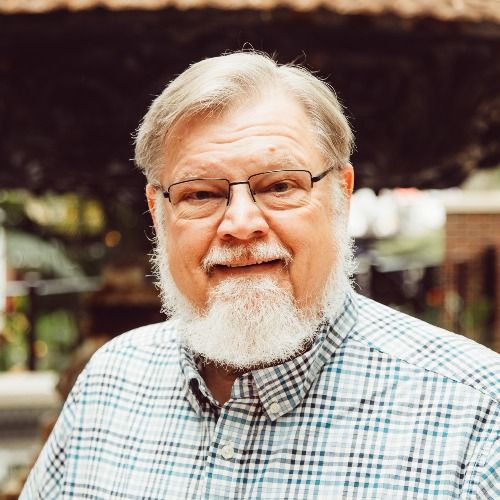Episode 901
Breaking Barriers: The Transformative Encounter of Jesus and Zacchaeus
The "Daily Bible Refresh" is presented each day by Rev. Dr. Brad Miller who has a goal of speaking a bit of the bible into two million ears (one million people) in three years (2025-2028).
He is the author of "The A, B, C-1,2,3 Bible Study Guide" Free to you by clicking HERE.
Brad served as a local church pastor for forty years and has a background in radio and podcasting. Moreover, he is a life-long student of The Bible.
He believes in the words of Jesus that “scripture is fulfilled in your hearing” (Luke 4:21)
The "Daily Bible Refresh" is available seven days a week by 6:00 am ET. The episodes are no longer than ten minutes long and are...
- Understandable: A reading from the New Testament (usually the Gospel) selected from the Revised Common Lectionary using "The Message" translation.
- Relatable: You will have a couple of "points to ponder" from the text which will relate to your life
- Applicable: Every episode includes a way you can take action based on the reading
- A recommended resource to help you go deeper in biblical study and spiritual direction.
- A prayer for your day.
A companion resource to the Voice of God Daily Podcast is the “ABC Bible Study Guide” available by clicking HERE.
The "Daily Bible Refresh" is available every day at VoiceofGodDaily.com on Apple Podcasts, Spotify and all major podcast directories.
You can help Dr. Brad attain his goal of getting a bit of the bible into two million ears by subscribing to "Daily Bible Refresh" on Apple Podcasts, leaving a five-star rating, and writing a review. More importantly please share with your network of family and friends about the "Daily Bible Refresh".
Please make listening to the "Daily Bible Refresh" a part of your daily life.
Remember… “All scripture is God-breathed and useful”(2 Timothy 3:16)
The account of Zacchaeus, as delineated in Luke 19:1-10, offers a rich tapestry of themes centered on radical inclusion, economic justice, and the communal nature of salvation. The narrative unfolds with Zacchaeus, a chief tax collector, who, despite societal scorn, seeks to catch a glimpse of Jesus. The speaker highlights the significance of Jesus’ interaction with Zacchaeus, particularly His decision to invite Himself to the home of one whom society has marginalized. This moment serves as a powerful reminder that divine acceptance extends beyond societal boundaries, affirming the notion that every individual possesses inherent worth and potential for transformation. The speaker emphasizes that such radical welcome not only alters the trajectory of Zacchaeus’ life but also invites us to reflect on our own capacity for inclusion within our communities and relationships.
Moreover, the discussion pivots towards the theme of economic justice, spotlighting the immediate and meaningful response from Zacchaeus upon encountering Jesus. His pledge to donate half of his wealth to the poor and to make restitution for his wrongs underscores a critical intersection between spirituality and economic behavior. The speaker argues that genuine spiritual transformation inevitably manifests in our financial decisions and relationships with economic structures. This prompts listeners to scrutinize their own practices, encouraging them to ensure that their financial choices align with principles of justice and equity. The narrative thus challenges us to critically assess how our economic behaviors contribute to societal inequalities and to seek ways to foster change within those systems.
Finally, the idea of salvation as a communal experience resonates strongly throughout the discourse. Jesus’ proclamation that salvation has come to Zacchaeus’ household suggests that transformation is not solely an individual endeavor but one that has communal implications. The ripple effect of one person's change can foster a more inclusive and just community. The speaker calls on listeners to engage in self-reflection and to consider how their own actions can contribute to collective well-being. By examining our economic practices and striving for greater inclusivity, we can create a society reflective of the radical love and acceptance exemplified by Jesus, encouraging all individuals to find belonging and hope.
Takeaways:
- The narrative of Zacchaeus illustrates the profound power of radical inclusion in our communities.
- Jesus' engagement with Zacchaeus signifies that no individual is beyond the reach of divine love.
- Zacchaeus' transformation underscores the importance of economic justice in our spiritual lives.
- Salvation is portrayed as a communal experience that influences the broader social fabric.
- Our financial practices must reflect our commitment to justice and community well-being.
- Engaging in acts of generosity and supporting ethical practices can contribute to transformative change.
Links referenced in this episode:
Transcript
Breaking Barriers Jesus, Zacchaeus and Radical Inclusion A reflection on Luke 19:1 through 10 on the Daily Bible refresh with Dr.
Speaker A:Brad Miller.
Speaker A:Hello my good friends, Dr.
Speaker A:Brad Miller here with Daily Bible Refresh inviting you to join me on this day to another reading of of the New Testament, which we do every day.
Speaker A: on years, a million people by: Speaker A:We do so by giving you a reading of the Scriptures from the Revised Common Lectionary.
Speaker A:It's a three year cycle of reading through the entire Bible.
Speaker A:We make it understandable.
Speaker A:We read from the New Testament Message Version relatable.
Speaker A:We give you three points to ponder, applicable and action step to follow.
Speaker A:We have a prayer and we do all that in under 10 minutes or so.
Speaker A:It's all brought to you by voice of Go Daily.com our website where you could find the ABC 123 Bible study method.
Speaker A:Let's get into our reading for today From Luke chapter 19:1 10 the story of Zacchaeus.
Speaker A:Then Jesus entered and walked through Jericho and there was a man there.
Speaker A:His name Zacchaeus, the head tax man and quite rich.
Speaker A:He wanted desperately to see Jesus, but the crowd was in his way.
Speaker A:He was a short man and couldn't see over the crowd, so he ran on ahead and climbed up in a sycamore tree so he could see Jesus when he came by.
Speaker A:When Jesus got to the tree, he looked up and said, zacchaeus, hurry down.
Speaker A:Today is my day to be a guest in your home.
Speaker A:Zacchaeus scrambled out of the tree, hardly believing his good luck and delighted to take Jesus home with him.
Speaker A:Everyone who saw the incident was indignant and grumped.
Speaker A:What business does he have getting cozy with this crook?
Speaker A:Zacchaeus just stood there, a little stunned.
Speaker A:He stammered apologetically, master, I gave away half my income to the poor and if I'm caught cheating, I pay four times the damages.
Speaker A:Jesus said, today is salvation day in this home.
Speaker A:Here he is, Zacchaeus, son of Abraham.
Speaker A:For the son of man came to find and restore the lost.
Speaker A:What a wonderful story and one of my favorites.
Speaker A:It's a powerful story about personal transformation, inclusion of those who've been excluded, and economic justice.
Speaker A:Let's get into some of the points to ponder for today.
Speaker A:There is the first one is the power of radical welcome.
Speaker A:Jesus deliberately chose to associate with someone whom society had deemed unworthy, a tax collector, Zacchaeus, who represented both religious impurity and economic exploitation in his community.
Speaker A:Yet Jesus specifically called him by name and invited himself to Zacchaeus house.
Speaker A:This radical act of inclusion reminds us that no one is beyond the circle of divine love and that true transformation often begins with being fully seen and welcomed.
Speaker A:Second point is about economic justice as a spiritual practice.
Speaker A:Zacchaeus response to encountering Jesus was immediate and economic.
Speaker A:Pledging of half of his wealth to the poor and quadruple restitution to those he cheated.
Speaker A:This highlights how spiritual transformation often manifests in our relationships with money and economic systems in our modern context.
Speaker A:This challenges us to examine how our own financial choices either perpetuate or challenge systems of inequality.
Speaker A:A third point is about salvation as being communal.
Speaker A:Jesus declared that salvation has come into this house.
Speaker A:That means not just Zacchaeus house individually.
Speaker A:This suggests that salvation isn't merely personal, but extends to all of our relationships, our economic practices and our place within the community.
Speaker A:When one person is transformed, it ripples out to affect the entire social fabric.
Speaker A:Let's talk about an action step.
Speaker A:Examine your own economic practices through a spiritual lens.
Speaker A:Choose one specific way to make your financial decisions more aligned with justice and community well being.
Speaker A:This might mean increasing your charitable giving or switching to a more ethical bank, or supporting local businesses or advocating for fair wages in the workplace.
Speaker A:We're gonna have a prayer in just a moment.
Speaker A:Just a reminder.
Speaker A:We have a great resource for you to help you with your own individual Bible study and I really hope you pick it up.
Speaker A:Please go over to voiceofgoddaily.com and we have a free gift for you there.
Speaker A:It's called the ABC 1, 2, 3 Bible Study Guide.
Speaker A:Pick it up.
Speaker A:It will help you with your personal Bible study.
Speaker A:Let's pray.
Speaker A:God you are divine.
Speaker A:Love and we confess that like that grumbling crowd, we too often judge who is worthy of inclusion in our communities.
Speaker A:Help us to see with your eyes recognizing the dignity and potential of every person.
Speaker A:Give us courage to examine our own participation in unjust systems and wisdom to know how to work towards transformation.
Speaker A:May we, like Zacchaeus, be willing to make concrete changes in how we live and use our resources.
Speaker A:Remind us that no one is beyond the reach of your love and that true transformation is always possible.
Speaker A:Guide us in creating communities of radical welcome where all can find belonging.
Speaker A:Amen.
Speaker A:Amen.
Speaker A:Amen.
Speaker A:Amen.
Speaker A:So great to be with you here on on Daily Bible Refresh.
Speaker A:We come to you just about every day.
Speaker A:It's before 6am Eastern time where we have the daily reading the New Testament.
Speaker A: n years, a million people, by: Speaker A:And the best way you can help me to do that is by subscribing to the podcast and inviting others to do the same.
Speaker A:I'll see you again tomorrow.
Speaker A:Until then, My name is Dr.
Speaker A:Brad Miller, and I'll be with you reminding you that God's loyal love doesn't run out.
Speaker A:His merciful love hasn't dried up.
Speaker A:It's created new every morning.



